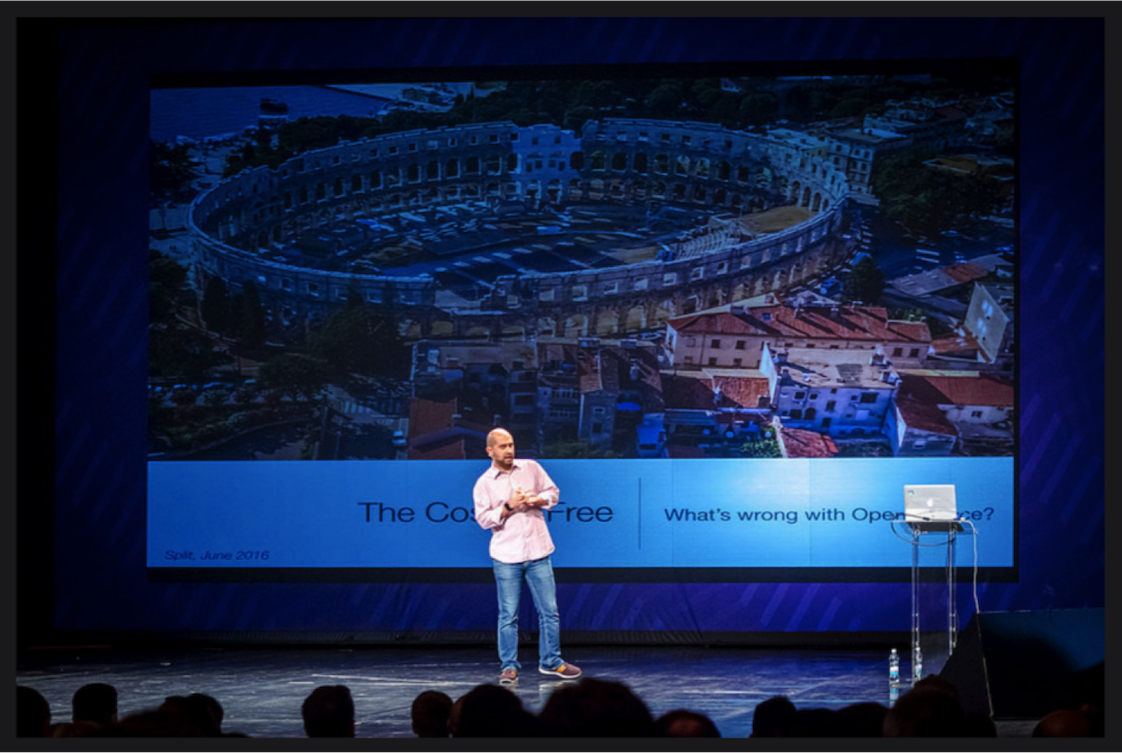
At the beginning of June our CEO Khash attended the Shift Developers Conference which took place in Split, Croatia. The event organizer Codeanywhere invited Khash to present a tech talk titled ‘The Cost of Free: what’s wrong with Open Source?’.
During the conference, Khash had an opportunity to catch-up with Franko Burolo, one of the staff writers at Croatian tech publication VIDI. An extract of the original interview published last month has been translated into English for your reading pleasure:
At the Shift Developers Conference in Split this year, Khash Sajadi, co-founder, and the CEO of Cloud 66, spoke about the problems relating to the commercialization of open source software.
The problems presented mainly focused on the shortcomings of open source projects and their functionality in the context of current market demands. Sajadi claims that few open source projects have complete authority as the defacto standard, throwing uncertainty over their future existence and thus making it difficult to contribute to the project's software development process - especially when commercial interests come in to play.
Sajadi argues that these problems are inherent in the fact that companies are turning to open source for financial gains, insisting on presenting an image where everything works for the good of the community, yet creating further dissonance between these two opposing interests. "It's okay to want to earn at the expense of open source software, but in such cases, it's necessary to present your agenda clearly" said Sajadi. Projects that to some extent have succeeded such as the Linux kernel, Red Hat or Canonical, are actually hybrid, semi-commercial projects that don't work in full accordance with the rules of the free software and open source movement. As such, these companies are adapting open source to create a monetized marketplace.
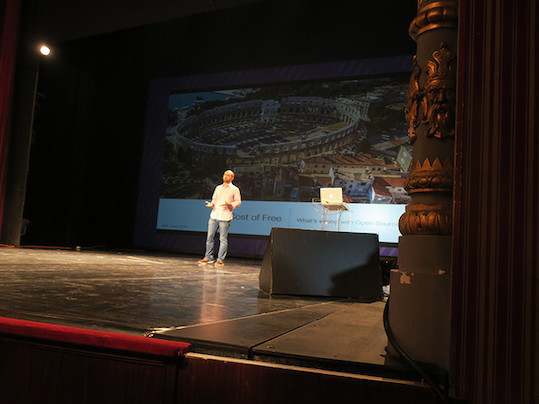
I had an interesting conversation with Khash Sajadi about his views on free open source software:
FB: During your talk, you spoke about the problems inherent in the commercialization of open source software. But hasn't the availability of open source allowed users to leverage software to economic advantage?
KS: I believe free availability of open source is a great thing. It reduces the cost of access to technology, which in itself can be an important source - not only of economic, but also social change. If for example, developing countries can get free access to the latest technologies to experiment and continue to build on it, then that's a great thing . And no startup could ever get off the ground if it didn't have access to the GPL version of MySQL instead of having to pay out millions in licensing fees to Oracle. However, if from the beginning we know that there are these two options and if we recognize their connection (i.e. Oracle owns MySQL and offers a proprietary free GPL version), free is therefore not really free because it's still linked to having a cost of ownership. Knowing this is important, as it allows for more informed and smarter decision-making around which technologies to invest in for the foreseeable future.
FB: Richard Stallman has always insisted on the fact that "free" does not mean free, but what it really represents are the freedoms at stake. As a software development company, you've adopted a different philosophy to the Free Software movement, and in your talk, you stated that one of the problems with the open source software community was that the community itself came at a cost
KS: I completely agree with you. From the very beginning of the Free Software movement, open source was meant to represent having access to free software, comparing it with the right to freedom of speech. I agree with that. But I would emphasize once again that we still need the means by which we can assess and make informed decisions. Compared with the broader social context, with established freedom of speech, everyone can say what he wants and that's just fine. However there's no distinction between what's being said - it could be coming from the tabloid press or from hard-hitting broadsheet journalism. But there is a difference. Both can say what they want and everyone can choose what to read. But when it comes to using this information to base our decisions, we need to be able to assess the quality and credibility of the information source. For instance, in the case of the presidential elections going on in the United States, both sides are saying what they want, but how are we determining whether what is being said is credible or even right? The freedom we have is our ability to evaluate the actual value of what's being propagated, in order to make more informed choices. It seems to me that we're still not sufficiently well informed when it comes to open source.
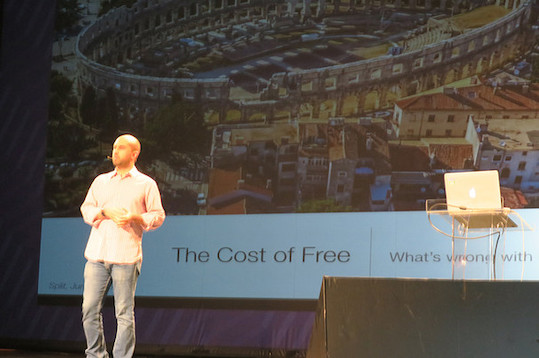
FB: Don't you think though the qualities which make up the definition of what constitutes Free Software; the freedom to run, copy, distribute, study, change and improve software programs - improves our access to information and our ability to be well informed?
KS: I think that freedom in the sense of saying whatever you want to say, or write whatever one wants to write, or use whatever you want to use is not the complete picture. In political systems, there's an important link between voters, candidates and journalism. The press has a duty to inform about what's happening. With IT, I rather see it like this: some are "chosen" by the people with their "elected" vote, through their likes or ratings and so on. This is the electoral system we've created; users and developers are the voters and everyone wants to publish their agenda under whatever license they want. As a programmer I can choose whatever option I want and it's all OK. But I don't see anything other than a commercial market mechanism by which to determine the winner. No press, no review, no criticism... there isn't anyone enquiring into why a company does what it does. It's not my job as a programmer because I'm not a politician, political scientist nor a sociologist. I'm just a developer who recognizes good technology and applies it to my projects. The point is this: we programmers can make good decisions based on the technology, but that decision based on technology alone has implications that go beyond our skills and our capabilities.
FB: Do you feel that this discrepancy occurs because the development of technology has now outpaced the readiness of where the rest of the market's at?
It could be. It may be what's currently pushing us forward, but the problem this time is this democratic movement for open source is also what's driving market conditions. It all comes down to who's able to attract large enough budgets to keep projects going. Much is still based on the technology no doubt, and there are many open source projects that have flourished. But it's come at the expense of the technology itself. What I don't see happening right now is pressure on the market that would force the issue of setting the "right" technologies. I don't see a real debate about technology itself, one that questions the investment and tactics being applied by various companies, or a debate that questioned the aims of these investments and actions and where they're leading us. That's what I'd like to see change.
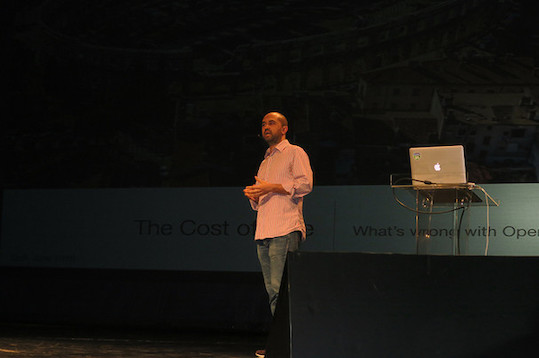
FB: You said in your talk that many open source projects lack authority, however there are some projects that arguably have become too much of an authority in their dominance. The development of the Linux kernel now revolves around Linus Torvalds - the so-called "perpetual benevolent dictator". We're seeing a similar phenomenon with Ubuntu, the most popular GNU/Linux distribution system thanks to the work of Mark Shuttleworth and his company Canonical. The examples are actually plenty; Perl, Python, WordPress, Drupal, etc... What are your thoughts on that?
It's interesting that you pointed this out. Those are successful products that are ultimately helping everyone elevate the entire technological eco-system. And these projects actually have become an authority and standard in their own right. The open source projects that have had the most impact are those who had a clear vision of what they wanted to achieve. Linus Torvalds has a vision of where Linux should move next and he's pushing in that direction. Nobody's preventing you from using another free Unix-esque system. You can if desired. But in the end the majority still use Linux, because it has a vision, because we know where it's going and where it's come from. The most successful open source projects actually share this common characteristic.
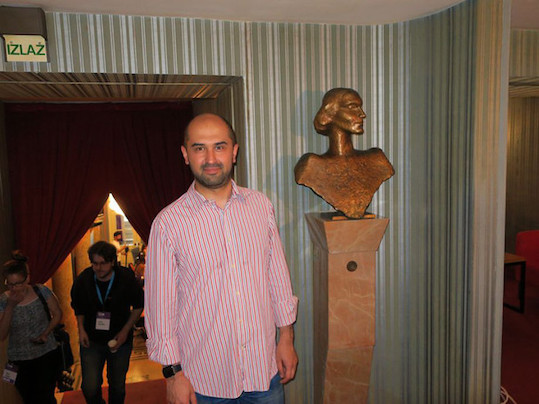
FB: In evolutionary terms, are these successful open source projects and their hybrid commercial models offering anything new? They still don't meet Stallman's original vision of free software in a free society, but they are far closer to that vision than the likes of a Microsoft or Apple. And in fact, their actions contribute to the whole free community of open source software and all its players, who in the future could push things even further towards progress.
KS: It could be that way. Because in any case, technological progress affects society as a whole. I look at the impact that Linux has so far achieved in society, what Android has managed to achieve through Google's impact. My view is that this impact was achieved thanks to their ability to become the standard, the authority in their field. I agree however, that the community has galvanised around successful open source projects, creating a much freer progress when you compare it to what's happening with the likes of Windows or Apple products. And I fully expect this progress to continue.
